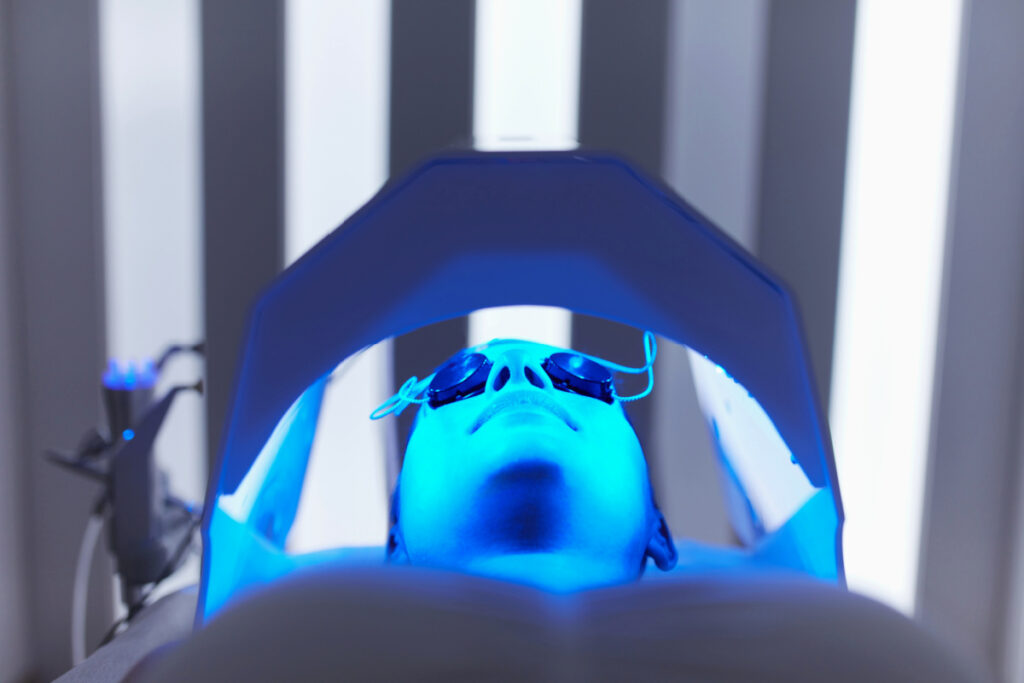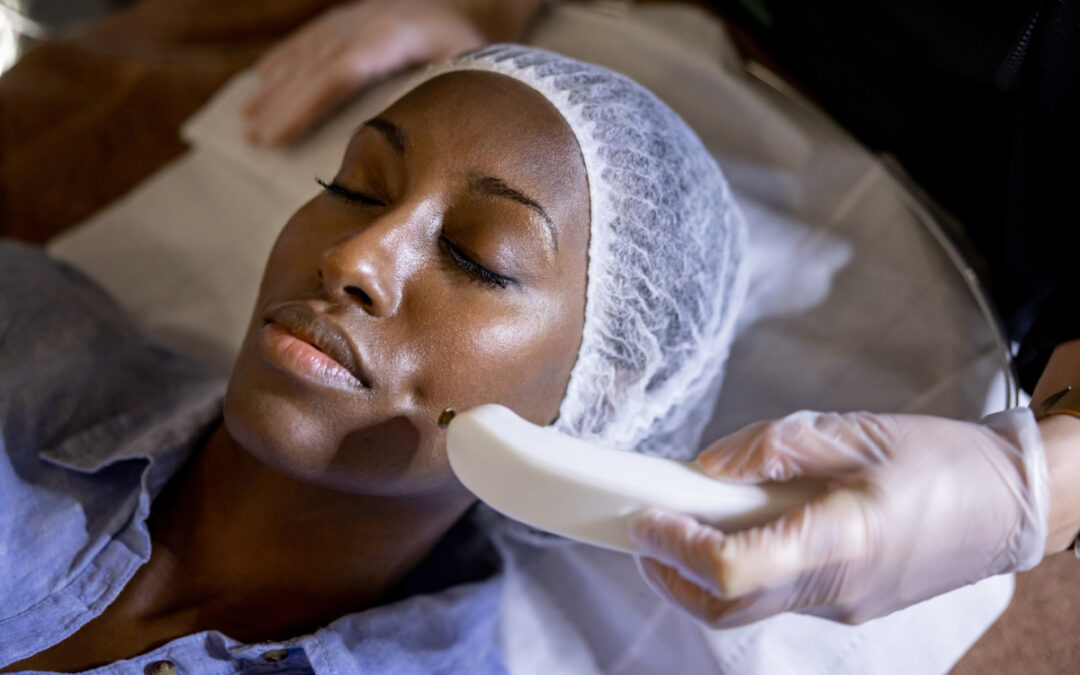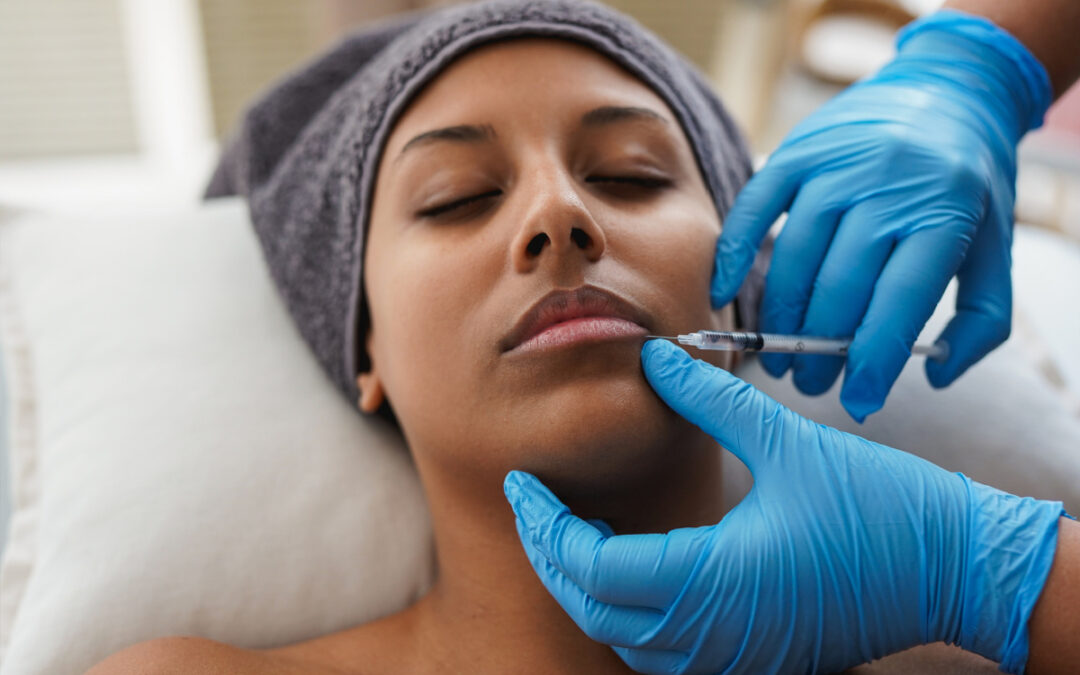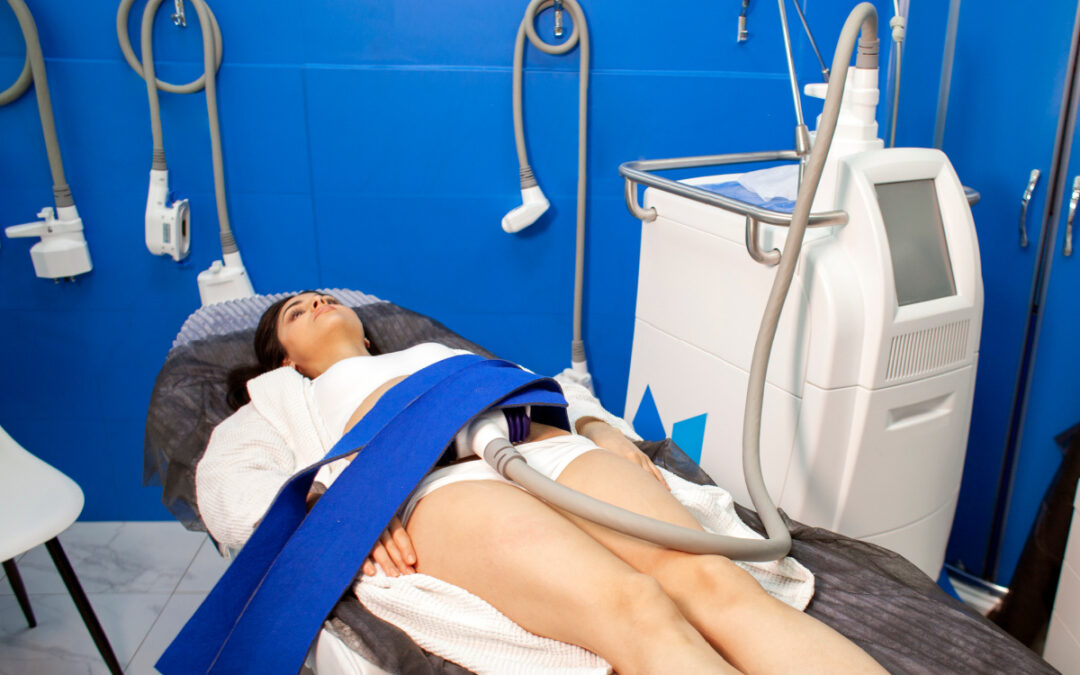No, You Can’t Just Step Outside for “Light Therapy”
Why would you book a light therapy session when you can just step outside? It’s a common question we hear at our Colorado Springs med spa, and honestly, we get it. Sunlight is free, natural, and feels amazing on your skin. So why would anyone invest in professional LED light therapy?
Here’s the short answer: While both involve light exposure, Celluma Light Therapy and sunlight work completely differently on your skin and in your body. Think of it like comparing a custom superfood supplement to a restaurant meal: both provide benefits, but one is specifically formulated for your needs, while the other contains some beneficial properties mixed in with some elements that are just for flavor.
In this post, our qualified skin professionals break down exactly why stepping outside won’t give you the same skin-transforming results as our Celluma treatments.
The Science: Not All Light Is Created Equal
When you step outside, you’re exposed to the full spectrum of sunlight, which includes:
- Ultraviolet (UV) rays that can damage skin and cause aging
- Visible light that affects your mood and energy
- Infrared light that provides warmth
Celluma Light Therapy, on the other hand, uses specific wavelengths of red (640nm), blue (465nm), and near-infrared (880nm) light that are scientifically proven to trigger cellular healing responses. These precise wavelengths penetrate your skin at different depths to target specific concerns—something random sunlight simply can’t do.
What Sunlight Can Do (And What It Can’t)
Everyone needs the sun, and sunlight offers both unique benefits as well as limitations that you should be aware of:
Sunlight’s Benefits:
- Boosts vitamin D production
- Regulates your circadian rhythm for better sleep
- Enhances mood through serotonin release
- Provides some infrared benefits for circulation
Sunlight’s Limitations:
- UV damage breaks down collagen and elastin over time
- Can worsen acne and rosacea in many people
- Increases risk of premature aging and skin cancer
- No control over dosage or specific wavelengths
How Celluma Light Therapy Works Differently
Our Celluma treatments deliver targeted light energy that penetrates deep into your skin cells, specifically your mitochondria (the powerhouses of your cells). This process, called photobiomodulation, triggers your body’s natural healing responses without any of the harmful effects of UV radiation.
What Happens During Treatment:
- Red light (640nm) stimulates collagen production and reduces inflammation
- Near-infrared light (880nm) penetrates deepest for pain relief and muscle recovery
- Blue light (415nm) kills acne-causing bacteria at the surface level

As a result, your skin gets exactly what it needs to heal, repair, and regenerate, delivered safely and consistently.
Celluma delivers targeted light energy that penetrates deep into your skin cells, triggering natural healing responses without UV radiation.
Light Therapy vs Sunlight: A Side-by-Side Comparison
Sunlight |
Celluma Light Therapy |
| Contains harmful UV rays | 100% UV-free |
| Uncontrolled light exposure | Precise wavelengths and dosing |
| Can worsen skin conditions | Clinically proven to improve skin quality |
| Risk of sunburn and damage | No risk of burns |
| Weather and season dependent | Consistent results year-round |
| Unsafe for extended periods | Safe for regular use |
Why Colorado Springs Residents Especially Need Light Therapy
Living at our altitude means we get more intense UV exposure than those at or near sea level. While those mountain views are gorgeous, our high-altitude sun can be particularly harsh on your skin. Celluma Light Therapy gives you all the cellular benefits of therapeutic light without the added UV damage that comes with our Colorado sunshine.
Conditions That Benefit from Celluma (That Sunlight Can’t Help)
Our patients see remarkable results using Celluma for:
- Acne and breakouts: Blue light kills bacteria that sunlight can’t touch
- Fine lines and wrinkles: Red light rebuilds collagen that UV rays actually destroy
- Post-treatment healing: Speeds recovery after procedures like microneedling
- Seasonal skin concerns: Consistent treatment regardless of weather
“Dr. Kenya is a true expert in her field—highly educated, incredibly professional, and genuinely passionate about her work. She took the time to walk me through every step of the process, making sure I felt informed, confident, and empowered. Her approach is collaborative and thoughtful; she listened closely to my goals, explained what would complement me, and provided guidance rooted in both science and aesthetics.”
— 5-star Google review
Can you use both? Yes!
We’re not at all anti-sunshine! A little morning sunlight can boost your mood and help regulate your sleep cycle. But if you’re serious about skin health and anti-aging, think of Celluma as your skin’s insurance policy against environmental damage.
Many of our patients enjoy brief sun exposure for vitamin D and mood benefits, then use Celluma treatments to repair and protect their skin from UV-related damage.
Make Celluma Part of Your Regular Routine
If you’re interested in incorporating Celluma Light Therapy into your ongoing skincare regimen, consider our Ageless Membership Program. Members receive complimentary Celluma Light Therapy sessions when appropriate for their treatment plan, along with a curated combination of treatments hand-selected by Dr. Kenya each month. Our 12-month membership includes everything from laser treatments and microneedling to neuromodulators and skin tightening!
Need a little light? Our Celluma Light Therapy sessions are relaxing, effective, and can be easily added to your existing skincare routine. Call us at 719-452-8541 or book online to see why so many Colorado Springs residents have made the switch from hoping for good weather to guaranteeing great skin results.
References »
Barolet, D., Roberge, C. J., Auger, F. A., Boucher, A., & Germain, L. (2009). Regulation of skin collagen metabolism in vitro using a pulsed 660 nm LED light source: clinical correlation with a single-blinded study. Journal of Investigative Dermatology, 129(12), 2751-2759. https://pubmed.ncbi.nlm.nih.gov/19571819/
Gold, M. H., Andriessen, A., Biron, J., & Andriessen, H. (2009). Clinical efficacy of self-applied blue light therapy for mild-to-moderate facial acne. Journal of Clinical and Aesthetic Dermatology, 2(3), 44-50. https://pmc.ncbi.nlm.nih.gov/articles/PMC2923954/
Hamblin, M. R. (2017). Mechanisms and applications of the anti-inflammatory effects of photobiomodulation. AIMS Biophysics, 4(3), 337-361. https://pmc.ncbi.nlm.nih.gov/articles/PMC5523874/
Papageorgiou, P., Katsambas, A., & Chu, A. (2000). Phototherapy with blue (415 nm) and red (660 nm) light in the treatment of acne vulgaris. British Journal of Dermatology, 142(5), 973-978. https://pubmed.ncbi.nlm.nih.gov/10809858/
Wunsch, A., & Matuschka, K. (2014). A controlled trial to determine the efficacy of red and near-infrared light treatment in patient satisfaction, reduction of fine lines, wrinkles, skin roughness, and intradermal collagen density increase. Photomedicine and Laser Surgery, 32(2), 93-100. https://pmc.ncbi.nlm.nih.gov/articles/PMC3926176/





